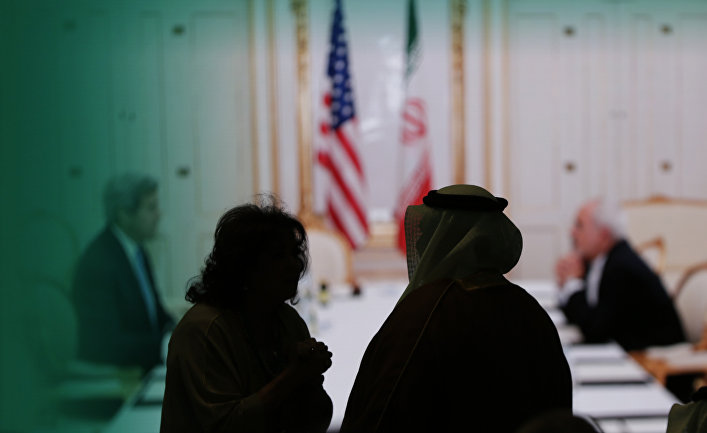“Is it time to make Iran our friend, and Saudi Arabia our enemy?” This was the provocative headline above an article by British publicist Michael Axworthy back in January this year — which went on to note how “Iran has become the stabilizing force of the Persian Gulf.” In other words, we have moved far on from the “axis of evil” rhetoric which was blithely wheeled out after September 11, 2001. Neither the fiery address of Israeli Prime Minister Benjamin Netanyahu to the US Congress on March 3, 2015, nor the maneuvering of neo-conservatives such as Thérèse Delpech at the French Foreign Ministry could prevent this u-turn in perception.
Iran had once terrified the entire region – but now as a leading anti-Islamist power, it has successfully negotiated a deal on its nuclear program, and formed an objective alliance with the USA and Iraq to oppose ISIL. Nor is Tehran the only example – the number of such perception u-turns is growing apace. Against a background of growing domestic terrorism threats and the corrosive effects on political stability of the EU migration crisis, there are no longer any convincing-looking reporting angles left – and the analytical implosion of the French press is the most telling evidence of this. From the peril posed by the Iranian regime through to its moral duty to “punish” Bashar al-Assad; from the impossibility of an Islamist Caliphate through to its European fate as a “Turkish model of democracy;” from the necessity of overthrowing Vladimir Putin to the urgent need to cement partnerships with the emirates of the Persian Gulf; from the durability of the Franco-German duet to the disgusting delight of seeing Saddam Hussein's execution – confidence has given way to fluctuations, arrogance is replaced by wobbling, and boasts have been supplanted by denials.
Saudi Arabia vs. Iran: Why Are We In The Middle?— today in the Liberty Report: https://t.co/KTgj8dfkDK
— Ron Paul (@RonPaul) October 30, 2015
It gets worse. Although we have continually insisted on the right of intervention, our inherited Atlanticist fate, and our Crusades against what Bernard-Henri Lévy termed “an abomination named sovereignty,” public opinion has repeatedly made it clear when polled that the overthrow of the Syrian regime, bolstering ties with Saudi Arabia, isolating Russia, and signing the TPP trade partnership are a long way distant from our national priorities.
This kind of ideological u-turn — in the form of hard-nosed reality when assessing the outcome of the messianic plans for intervention which followed September 11 — severely puts the wind up those who devised French foreign policy in the Sarkozy and Hollande years. Even so, no admission of the disastrously mistaken chaos which has resulted from 'regime change' in recent years is permissible. In order to defend the indefensible, there's only one way out – shifting the blame onto a convenient scapegoat. And who could be as handy as Barack Obama, of all available world leaders, to carry the can for Middle East chaos, born of his weakness and pussyfooting?
Recep Tayyip Erdogan, Turkish Prime-Minister, believes Obama is gutless. Sunni monarchies in the Persian Gulf barely bother concealing their contempt (or racially-prompted disgust) for the American President who is currently playing the Iran's-our-enemy card. Obama's failed opponent in the 2008 elections, John McCain – a man ever-ready to open his mouth about arms in Iran and Ukraine – claims that Obama “shames” American leadership. Identical claims can be heard coming from the Republican Party's latest star, Donald Trump. Francois Hollande, too, avers that the big boost for ISIL came “on the black Saturday in late August 2014” when America's refusal to act prevented France from bombing Assad's Syria.
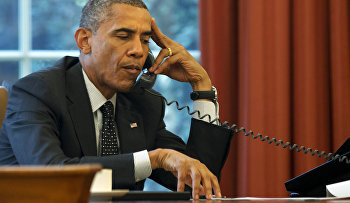
Whatever we choose to call it, Obama's foreign policy cannot be reduced merely to a series of fluctuations – in spite of its series of failures and uncompleted initiatives, it still stands head-and-shoulders above that of his British, Saudi, French and Israeli partners. He didn't try to boost his own ratings as a “war president,” but rather tried to follow a course of overall diplomatic restraint – which he acted for when he took office after the catastrophic epoch of Bush Jr. The agreements he reached on July 1, 2015 with Cuba, and on July 14 with Iran — and his relative caution on the issue of Ukraine, despite his personal dislike of Vladimir Putin and the hysteria among the Reagan-leftover opposition – all adds up to suggesting a clearly-defined political direction. The contrast is clear, to even the naked eye, with Sarkozy's Libyan caper of 2011, the boneheaded aggression of Netanyahu, or with Hollande's obstinacy on the Syrian issue from 2012 onwards.
End of the Afghan War, no combat troops back in Iraq, no ground troops in Syria. All Obama promises, all now broken. https://t.co/cBJADyANCY
— Trevor Timm (@trevortimm) October 31, 2015
The only people Obama disappoints are sleepwalkers – those still living in the happy memory of the “diplomacy” exercised by Donald Rumsfeld, Tony Blair and Condoleeza Rice. His entirely credible policies have rejected the foolhardy adventures which (especially in the Middle East) attempted enforced “regime change” with no suitable replacement for the future. Here we are talking about the so-called 'Gates Doctrine' (named after the US Defense Minister from 2006 until 2011). “The last thing America needs is another exercise in nation-building” he claimed in Congress about the war in Libya, exactly at the moment when Obama was being accused of “leading from behind.” This laconic statement became an iconic symbol of the era of intervention.
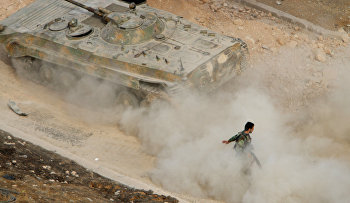
It all seems as though, after long indecision, the White House has finally trashed the pamphlets of neoconservative hawks like Norman Podhoretz and Irving Kristol, and delved once more into the writings of Aristotle. There they can remind themselves of the basis of strategic thinking. “None of our Spartans could decide what the best form of government would be best for the Scythians — because matters didn't depend on us. We accept decisions about things which depend on us, and the things which we have done. Our decisions are not about the results, but the means used to attain those results.”
It's true that Obama can certainly be blamed for much of the Syrian problem, beginning with his weakness towards the Turkish government, who have been the most cynical manipulators of all those involved in the conflict. Regrettably it ill-behoves France to point the finger in this regard. Fine words butter no parsnips, and France's role in the history of the Syrian question is unlikely to stand up to analysis. Paris spent a month saying that it will not bomb ISIL, because doing so would give succor to Damascus – by which it meant, of course, its main enemy. By supporting one side in a civil war Paris reached the end of its logical tether, and dispatched weapons to the “moderate” opposition which quickly ended up in the arsenals of the terrorists.
On September 27, 2015 (during a period when things were going from bad to worse) France finally decided to bomb ISIL. The Elysée Palace called it a “strategic evolution” — elegant phraseology to seduce any observers who might have possibly confused this with a total absence of strategy. Allowing himself to “evolve” a little too, Francois Hollande “reminded” Vladimir Putin, when he met him on 4th October, that “ISIL is a foe which must be fought.”
The self-confidence of this statement is remarkable. The only people it impresses now are those suffering from memory loss. From the onset of the Syrian uprising in 2011 and its gradual transition to Islamic control of ever-increasing ferocity, Vladimir Putin has consistently supported two approaches. The first is the support of President Assad, and the second is the destruction of ISIL on the same level as 'al-Qaeda' (both being top-priority risks) for a subsequent political settlement as a kind of evolution of the regime. Whatever thoughts the Kremlin may have had, no-one there entertains any serious idea that Assad will cling onto power for long. That's the exact reason why Russian FM Sergey Lavrov had meetings with Syrian opposition leaders such as Khalid Khoja and Haytham Manna. “No more Gadaffi's.” Moscow's strategy may be criticized, but at least it's stable and transparent. This only serves to highlight Ankara's cynical approach, Riyadh's nervous fidgeting and Paris's continuous direction-shifting. It's all in sharp contrast to the diplomatic and military solution France pursued in Mali and the Central African Republic during 2013 and 2014 – which received widespread international support.
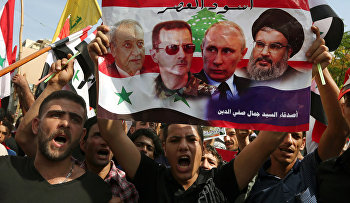
The result of this hopeless preaching stagnation in international relations has been a rise in the number of diplomatic initiatives which aren't solely based on Western solutions. These are strategic changes of a fundamental nature. Who are the key players in the Middle East today? Definitely not Obama, who is more interested in Eastern Europe and the Euphrates Valley – although even these are not his trump cards, as he's primarily angled towards the Pacific. Nor is Hollande a contender, since he's hiding behind Berlin's back in Europe, and behind Washington's in the rest of the world – yet criticizes both capitals to give the illusion of independence. So what about the regional powers of the Middle East? Tel-Aviv is still recuperating in a stupor after Washington's rapprochement with Iran, along with the latest Palestinian uprisings. Riyadh is leaching cash due to collapsing oil prices, along with its disastrous intervention in Yemen. Ankara has declared the latest in a long series of wars on the PKK, with dented credibility after it tried to play the ISIL card against the Kurds.
The Middle East game is now in the hands of Russia and Iran – although China, currently keepings its distance, may yet be tempted to eye the opportunities the Middle East offers and come forward with some diplomatic solution of its own. In 2013 Moscow altered the power balance fundamentally, when it presented all those involved in the conflict a get-out, by neutralizing the Syrian chemical arsenal. The chess-playing Putin is now rooking on the Syrian board. On 28 September he presented the UN with a plan for forming a new anti-terror coalition – and then immediately began air-strike intervention (at Syrian government request) which were intended not only to hit ISIL, but support Syrian army gains. (These moves won the support of Saudi Arabia, Turkey and Qatar, whose alliance which boasts many Salafists in Ahrar al-Sham, along with al-Nusra Front, the Syrian brand of 'al-Qaeda').
Iran has accepted an invitation to join the US and Russia in talks on Syria’s future https://t.co/SDUFMTmwsF pic.twitter.com/GSBlV8Nna9
— The New York Times (@nytimes) October 28, 2015
This Russian initiative reshuffled the cards in the tense game of the Middle East. Despite a year of operations and 7000 raids on ISIL targets, one can only call the strategy of the US-led coalition a complete failure. US Secretary of State John Kerry now agrees on the idea of timetabled negotiations regarding Assad's stand-down, along with the need for collaboration with Russia and Iran. With this in mind, the following quotation picks-up a still-more relevant ring: “Although Assad's departure, the defeat of ISIL and future peace for Syria are all part of the end-plan, it's never a good idea to try doing everything at once.”
Like many other experts, American analyst Matthew Rojansky is rereading what Chinese military strategist Sun Tzu wrote back in the Sixth century BC – it is better to fight on one front than two. Henry Kissinger came to the same conclusion. The common mantra chanted by Erdogan and Fabius concerning the existence of an “objective alliance between Assad and terrorists” has lost all meaning. In France, of course, there is a lot of face-saving going on prior to the 2017 General Elections. However, this persistent denial is not only counterproductive for the strategic plan, but will soon collapse in the media too. Additionally, it might even prove political suicide, if Russian and Syrian troops succeed in retaking Palmyra. It's hard to imagine that such a tough operation might really come off — yet it's equally hard to believe that Putin and Lavrov aren't considering it. Whatever the result, Russia's present strategy has the open support of Iran and… Iraq. Egypt doesn't really mind. China looks on, and does not judge.
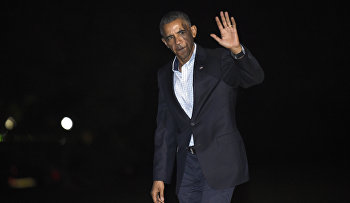
It works out that surprise – the main factor in any strategic initiative – is in the hands of the 'non-western' players in the Middle East game. Amid the maelstrom an enfeebled America and an opportunistic Russia continue to seek out their own interests. These will never be fully compatible with European interests – and complete support for either Washington or Moscow would in any case amount to intellectual surrender. We would far rather sing the praises of a French diplomat than be honest about Putin's tactical superiority. However, the banks of the River Seine continue to be illuminated by the funeral lamps of neo-conservatism, while the European Union has kissed France's external security farewell (with the exception of some operations in Africa). The fact that more and more people regret this situation, despite all the political wrangling, is far from the best, or adequate comfort.
